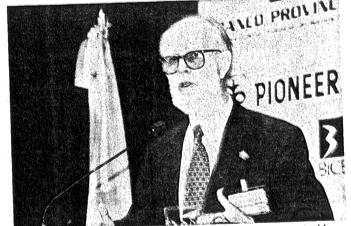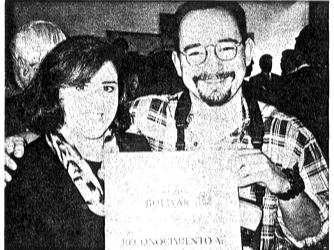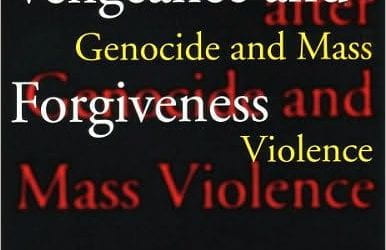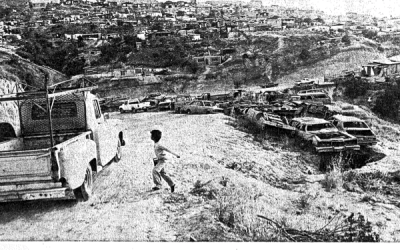Solbrig Wins International Biology Award

Solbrig organized DRCLAS’ first international conference on sustainable development in Buenos Aires in March 1997.
Bussey Professor of Biology Otto T. Solbrig, a member of the DRCLAS Executive Committee, has won the 1998 International Prize for Biology, presented by the Japan Society for the Promotion of Science. The prize is given for outstanding contributions to the advancement of research in fundamental biology; the specialty for the 1998 Prize was “The Biology of Biodiversity.”
“This is the leading prize in the world for botanists,” commented Peter Ashton, Charles Bullard Professor of Forestry at Harvard. “It’s the equivalent of the Nobel Prize for people in that field.”
Solbrig, who was born and raised in Argentina, is the first recipient from Latin America or any third world country. He will be honored in Tokyo in a December 7 ceremony, in the presence of the Japanese Emperor and Empress and with the attendance of the Prime Minister and the Minister of Education, Science, Sports and Culture, as well as scientists from around the world. The award comes with a medal and $10 million yen (around $75, 000).
“Otto is a pioneer in plant demography and the nature of ecological diversification in plants,” added Ashton, who is Solbrig’s colleague in the Department of Organismic and Evolutionary Biology. “He is not only an outstanding scholar, but also outstanding in the public arena, particularly in his recent contributions to issues of sustainable land use in Latin America.”
Solbrig organized DRCLAS’ first international conference, “Towards a Sustainable and Productive Agriculture in the Pampas,” last year. He has co-edited three books on conservation agriculture, written several articles, and given talks and symposia. With his wife Dorothy, he wrote a book for general audiences, So Shall You Reap, that outlines the history of agriculture, culminating in modern high input agriculture.
“Otto Solbrig’s energy, erudition, and humanity have played a crucial role in launching the David Rockefeller Center and in building the Center’s strong commitment to environmental studies and to scientific exchange and collaboration throughout the Americas,” said DRCLAS Director John Coatsworth. “We are proud and delighted by this new recognition of his scientific achievements”.
Solbrig is a former president of the International Union of Biological Sciences (IUBS) and the Society for the Study of Evolution. He serves on the editorial board of several scientific journals, and has served as a consultant for UNESCO, UNEP, UNDP, and the United Nations Conference in Rio.
He was one of the first researchers in the world to realize the threat that the transformation of tropical landscapes posed for the maintenance of biodiversity. He led a study on “Convergence and Divergence of Ecosystems” during the International Biological Program (1970-1976) comparing ecosystems in the United States and Latin America, culminating in a book by the same name produced in collaboration with Gordon Orians. From 1982-1992, he organized and directed the “Decade of the Tropics,” a program that produced a number of studies on tropical soils, savannas, and human biology, dealing with biodiversity. He is now involved in fostering conservation agriculture in Latin America. This long dedication to the environment and biodiversity have now culminated in his being awarded the International Prize for Biology, his colleagues say.
The International Prize for Biology was established in 1985 to celebrate the 60th anniversary of the reign of Japan’s Emperor Showa and to commemorate his long-held interest in scientific research in the field of biology. Solbrig is also only the second scientist from the southern hemisphere to receive the award; one previous recipient was from Australia.
Previous Harvard winners are Edward O. Wilson, Pelligrino University Professor Emeritus, and Ernst Mayr, Professor of Zoology Emeritus.
Fall 1998
Related Articles
Caballero wins Colombia’s top journalism prize
Building on work she started at the David Rockefeller Center for Latin American Studies, investigative journalist Maria Cristina Caballero has won Colombia’s top journalism prize…
Between Vengeance and Forgiveness
At the close of this century of death camps, killings fields and desaparecidos, there is perhaps no more urgent question than the one raised in Martha Minow’s useful new book: Can societies…
The Environment in Latin America
This issue of the DRCLAS NEWS deals with some of the environmental problems of Latin America, one of the priorities of the David Rockefeller Center for Latin American Studies…




